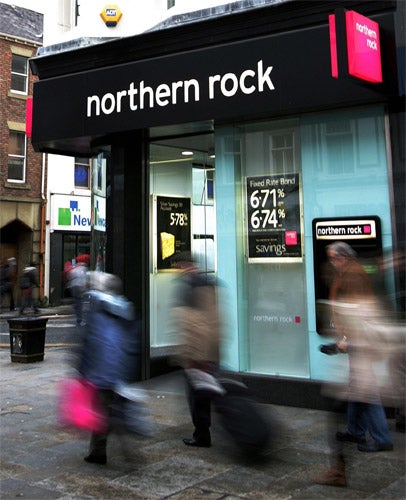Northern Rock on the rack – and we're paying
£725mloss in first six months of year; 22,141 of borrowers more than three months in arrears; £11bn of taxpayers' money tied up in stricken bank

Your support helps us to tell the story
From reproductive rights to climate change to Big Tech, The Independent is on the ground when the story is developing. Whether it's investigating the financials of Elon Musk's pro-Trump PAC or producing our latest documentary, 'The A Word', which shines a light on the American women fighting for reproductive rights, we know how important it is to parse out the facts from the messaging.
At such a critical moment in US history, we need reporters on the ground. Your donation allows us to keep sending journalists to speak to both sides of the story.
The Independent is trusted by Americans across the entire political spectrum. And unlike many other quality news outlets, we choose not to lock Americans out of our reporting and analysis with paywalls. We believe quality journalism should be available to everyone, paid for by those who can afford it.
Your support makes all the difference.Northern Rock yesterday revealed the dark side of British banking, unveiling losses of £725m and an increase of taxpayer funding to £10.9bn.
Just a day after Barclays and HSBC reported close to £6bn of first half- year profits, the lender that was nationalised after thousands of savers queued to withdraw money from its branches admitted that four out of 10 of its borrowers were now in negative equity – representing 218,400 households.
The number of customers in arrears over three months has surged to 22,141, or 3.92 per cent, due in part to the bank's notorious 125 per cent mortgage product. That compares to 3.67 per cent in arrears three months ago and 2.92 per cent at the end of last year.
Bad loans accounted for £602.2m of the losses and the number of houses in possession still stands at 2,522, down from 3,620 at the end of the year but still many times the numbers reported by Barclays and HSBC.
Run by former Barclaycard boss Gary Hoffman, Northern Rock also said that plans to lend up to £5bn had been cut back by £1bn.
It is hoping to borrow a further £3bn from the taxpayer, on top of the £10.9bn it has already received, and split into two companies, one of which, AssetCo, will hold much of the bank's existing book of loans and be responsible for repaying the taxpayer's largesse. A Northern Rock spokesman insisted that this was "not a bad bank", arguing that "most of the loans within it will be performing loans".
"There could eventually be an appetite for this sort of business to be sold," he argued.
However, the split does mean that the other part of the operation – BankCo – will hold savers' money and be responsible for new lending. It will be in a state that may make it attractive as a sale candidate, having been shorn of any toxic assets. And a sell off could take place from the autumn if the European Commission approves the injection of the £3bn of state aid that will be required if BankCo is to be created.
It leaves the tantalising possibility that the Government may be able to dispose of at least part of what remains of Northern Rock before the next general election. However, ministers are facing growing demands from left-wing politicians to scrap any sales plans and remutualise BankCo as a building society, which Northern Rock had been before its disastrous foray into banking.
The bank's deposit base – now crucial to supporting new lending after its reliance on short-term money market cash that dried up in the credit crunch and left it reliant on government hand- outs – has also fallen to £18.4bn from £19.6bn. Government borrowing was £8.9bn six months ago, £2bn lower than today. The debt increased after the bank was ordered to start lending again by ministers having pulled out of the market with the aim of paying back taxpayer's money as quickly as possible.
This policy is one reason why Northern Rock's repossessions soared. The change in policy resulted in a pledge to lend the £5bn, now £4bn, this year – although the fall has been blamed on European foot-dragging that has delayed the restructuring and split. A further £9bn of home loans were expected to be advanced next year, in a bid to stimulate Britain's struggling housing market.
Rock's chief executive, Gary Hoffman, the one-time boss of Barclaycard during a time when the credit card business was facing spiralling bad loans, admitted that Northern Rock continues to find trading tough in the current climate.
He said: "The current environment continues to be challenging, however against this backdrop Northern Rock is making progress against its revised plan and has delivered results in line with expectations. We anticipate receiving State aid approval in the autumn and the legal and capital restructuring of the company to be completed by the end of the year. This ultimately prepares for a return to the private sector."
Attempting to put a gloss on the figures he said there had been signs that the number of customers in the early stage of the arrears process – missing perhaps one or two payments – had come down largely thanks to all-time low interest rates.
A year ago many customers found themselves coming off cheap fixed-rate deals and unable to refinance which meant repayments were jumping by £150 or more a month. Their plight has now eased.
Northern Rock declined to comment on who might run each of the two companies after the split, saying "this has not been decided yet".
Join our commenting forum
Join thought-provoking conversations, follow other Independent readers and see their replies
Comments